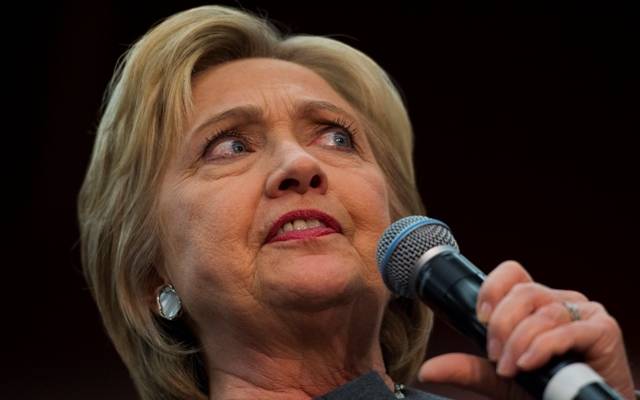The potential political costs of this ongoing public scandal are probably of more immediate concern for Clinton who is perceived by many as untrustworthy.
The State Department on Monday released the 14th and final batch of emails from former Secretary of State Hillary Clinton’s private server, bringing the total to more than 52,000 including 2,100 that were censored or withheld completely for containing information now deemed classified.
In releasing the final batch of 3,800 documents, the department also settled a long-running dispute over one sensitive email as intelligence agencies dropped a months-long demand for an exchange on North Korea’s nuclear program to be designated “top secret,” the highest level of classification. The State Department, which had insisted the information was not classified at all, partially won its battle over the document as the intelligence community revised its initial assessment and determined the information was “secret,” the next lower classification.
“Based on subsequent review, the intelligence community revisited its earlier assessment,” State Department spokesman John Kirby told reporters. He added: “The original assessment was not correct and the document does not contain top secret information.”
The announcement came a day before Clinton competes in 11 Democratic primary contests. She is the front-runner to win the Democratic presidential nomination. The department faced a Monday deadline set by a federal judge to release the final documents from the private server Clinton exclusively used while in government. Clinton aides went through her emails and turned over the ones they determined to be work-related.
The North Korea email is one of two that Charles I. McCullough, lead auditor for US intelligence agencies, identified last year as particularly problematic. The other concerned the CIA’s drone program and led to officials classifying 22 emails from Clinton’s private account last month as “top secret.” They were withheld from publication.
No emails Clinton wrote or received were marked as classified at the time of transmission, which Clinton has repeatedly cited in her own defense.
As with earlier releases, Monday’s contained emails with information that has been upgraded to “secret” and “confidential.” Two hundred and sixty one were so identified, bringing the total of such upgrades to more than 2,050 for the entire set. No material in Monday’s release contained documents with information now deemed “top secret.”
As with earlier releases, Monday’s contained emails with information that has been upgraded to “secret” and “confidential.” The department identified 261 as such, bringing the total of those upgrades to 2,093 for the entire set. No material in Monday’s release contained documents with information now deemed “top secret,” meaning the total number thus designated remains at 22.
However, the current batch did include one message with an attachment that purported to be a classified note that Tom Donilon, Obama’s national security adviser, slipped into Jerusalem’s Wailing Wall on a trip to Israel in 2012. However, officials said the attachment along with its contents were, in fact, a joke sent to Clinton by an aide.
On the North Korea document, Kirby stressed that the exchange had only been “provisionally” upgraded in classification, suggesting the department doesn’t even fully accept the lesser finding.
“The information available to diplomats and the judgments they form do not necessarily need to be classified just because there are parallel intelligence sources,” Kirby said.
In addition to portions of that document being censored, one email between Clinton and President Barack Obama was also withheld from publication on Monday, bringing to 19 the total of such messages that have been kept private to protect the president’s ability to receive advice from his aides. Those emails are not classified and will be released eventually like other presidential records.
The potential political costs of this ongoing public scandal are probably of more immediate concern for Clinton. She has struggled in surveys measuring her perceived trustworthiness, and an active federal investigation, especially one buoyed by evidence that top secret material coursed through her account, could negate one of her main selling points for becoming commander in chief: Her national security resume.
By: AP and United with Israel Staff
